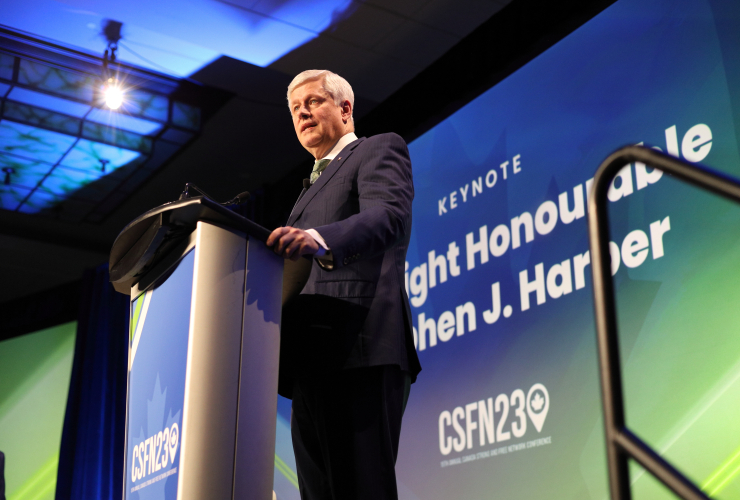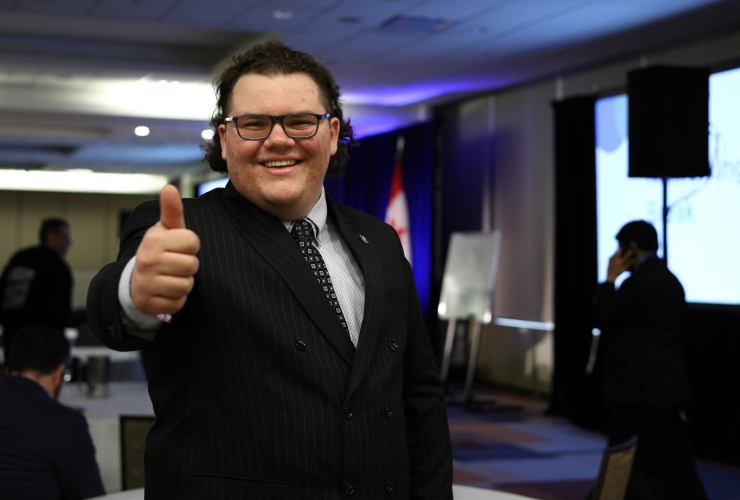Something feels a little different at this year’s Canada Strong and Free Network (CSFN) conference.
It’s probably the “star power,” Tom Flanagan, the semi-retired political scientist, right-wing pundit and author of Pivot or Pirouette, tells me via Zoom from his home in Calgary.
Preston Manning.
Danielle Smith.
Pierre Poilievre.
A host of other big names from across Canada, and even south of the border, are making appearances at the three-day networking event.
"Going from memory, this strikes me as the biggest assemblage of stars ever,” says Flanagan.
The standout is, of course, Stephen Harper.
The former prime minister has rarely made public appearances since leaving politics in 2015.
“You know, Stephen sees this party as his creation, and he's always wanted to sort of institutionalize the Conservative Party of Canada as a majority party that can win election after election like Liberals," says Flanagan. “Stephen has nothing to gain personally (from the appearance), so he must see this as an important inflection point in politics.”
Even more striking than Harper’s appearance is the fact he is sharing the stage with Preston Manning, one-time leader of the Reform Party and founder of the CSFN.
The two men, both elected under Reform in 1993, saw their friendship chill while serving in Ottawa. Harper publicly criticized Manning. He broke away in 1997, deciding not to run again. Not until Manning was out. Harper returned when the new, united Conservative Party swung into motion.
Their relationship has remained cool ever since.
There was no sign of that Wednesday night, as they sat down on stage before approximately 700 people and chatted like old friends reunited.
Mulroney's tent was too big, O’Toole’s tent was too small
There’s no doubt the “inflection point” Flanagan is speculating about is current Conservative Leader Poilievre.
The Conservatives have had three leadership races since Harper’s departure, which divided the party faithful. Reuniting the conservative movement and expanding it now falls to Poilievre, an unlikely reconciler. He is known for his snappy one-liners and drawing blood with sharp political fangs. What the conservative movement really needs right now is a group hug.
Last year when I attended the CSFN event, I wrote: “... If the room is any measure of the mood across the country, conservatives want to leave ‘big tent’ parties at the circus.”
At the time, conservatives in the room sounded frustrated.
Erin O’Toole won the party leadership on a “true blue” campaign, then switched to the big tent approach during the election, hoping for broader appeal, and lost anyway.
That left the conservative movement asking: If we’re going to run, why not run a real conservative platform?
At Wednesday’s soiree, Jamil Jivani, a former radio personality, president of the CSFN and an icon for conservatives in his own right, took to the stage to introduce the Harper-Manning crowd extravaganza with an anecdote.
“Earlier this week, we got a question from a member of the media,” said Jivani. “They asked us if we believe the conservative movement is moving away from being a big tent movement and is now focused only on conservative principles.”
There was a dramatic pause.
The crowd tittered.
Jivani held up his hands as if pleading with the crowd to take pity on that silly journalist. “Now, you can laugh at the question, but it's a question a lot of people probably would ask. So I think it's worth answering.”
Jivani told the reporter: “For the CSFN and, hopefully, everyone in the room today, we believe both of those things can happen at the same time.”
So, a year later, there is still distaste for the kind of big tent campaign O’Toole ran. Conservatives picked Poilievre because he was born a conservative (I picture a bespectacled baby in dark blue diapers and a tie) and has never once lost a staring match or even flinched. The conservative movement — at least the base at the CSFN — thinks the best strategy is to build a blue tent.
And it only needs to be big enough to fit a few extras, according to Flanagan’s analysis.
“The Conservative Party can't win nationally unless it is a big tent party. So Poilievre has to create his own big tent. Harper did. Although Harper was so strongly identified with the old Reform Canadian Alliance tradition, as soon as he became leader, he put enormous efforts into creating his version of a big tent,” says Flanagan, noting Harper took French lessons and won just enough seats in Quebec “to be respectable,” if not entirely popular, in La Belle Province.
Brian Mulroney had a big tent also. Too big, according to Flanagan.
Inside, Quebec nationalists huddled with the traditional Tory base and western populists. “And it fell apart. So you don't need to have that huge tent … but it has to be big enough. It has to be broader than the western populists.”
Harper proved Conservatives could win while being further to the right than Mulroney. Now, that same task falls to Poilievre.
Add a smidge of populism
Back to the CSFN soiree.
There’s little doubt party elders came out to bury hatchets and draw the right together for Poilievre, who Harper affectionately jokes was “a very tiny Reformer at the time when I was first elected.”
Harper and Manning reminded the crowd that in the 1990s, Ronald Regan and Margaret Thatcher came from outside the political and business establishment of their day. The Reform Party was in part a product of that era, unorthodox for its time, portrayed as radical by the media and rejected by the elites.
“That, by the way, to be blunt, that is Pierre Poilievre today,” Harper said, drawing a line to the new leader as a natural product of that legacy.
As for me, I always understood Poilievre as a politician shifting the party even further to the right than Harper. Derek Fildebrandt, publisher, president and CEO of the Western Standard and former Wildrose finance critic, maintains I’m wrong.
“There's less room for pro-lifers in the party than there was 10 and then 15, 20 years ago, so I don't think it's necessarily more conservative,” Fildebrandt said. “Poilievre is probably the most punchy and aggressive Conservative leader in the history of that party. I just think his tone is more aggressive and his appeal is more populist.”
Fildebrandt attended a very large People’s Party of Canada rally east of Calgary last election and “was pretty shocked” by the diversity in the room. Traditional-looking conservatives. Bikers. Metal punks. Hippies.
“It was a motley crew. A lot of those people were not traditionally conservative but were attracted by a populist, anti-establishment message,” he says, citing the low-hanging fruit of the anti-lockdown movement and, more recently, Poilievre whistling a sort of Thatcher-like economic populism with his talk of gatekeepers.
And perhaps somewhere in that feeling of disengagement is where the conservative movement will find those who feel comfortable in their tent. Liberals tired of Trudeau. Truckers with “Fuck Trudeau” bumper stickers. Young people who can’t afford groceries, much less a house.
“Populism does have its wild and woolly side,” Manning tells the room. But populist movements, he added, got the first woman elected and gave the West control over natural resources. “Populist energy can be harnessed in very positive and constructive objectives. And if one is a populist and a populist leader, that's one of the challenges, to make sure that it's channelled in that positive direction.”
Which makes me ask: How are we even defining populism these days?
“Populism in a more specific sense is a worldview which is distrustful of political elites and emphasizes the virtue of the common man,” Flanagan said. “It's neither conservative nor liberal, really. It's a different kind of approach to politics.”
Populism is tricky business, though, warns Flanagan.
“You can't take it so far that you turn off the potential allies that you need to win,” he says. “There's plenty of material to use in attacking the people in power and saying that they have neglected the interests of ordinary people. So, will it work? I don't know. My weakness as a pundit was I could never foretell the future.”
Pierre Poilievre has the same
Pierre Poilievre has the same problem as all the other CPP leaders. He owes everything to the worst Canadians whose only aspiration is never voting for anybody better than themselves. You can't get elected like that ... even if you've got every Canadian who doesn't know what's good for them on your side.
"Harper and Manning reminded
"Harper and Manning reminded the crowd that in the 1990s, Ronald Regan and Margaret Thatcher came from outside the political and business establishment of their day." Yes they did and their policies were disastrous for the middle classes in both countries.
I would dearly love to know what any of these leading lights are thinking about what's happening in the US right now as well as Brexit. That seems to be the logical extension of their idea of populism. Heaven Help us!
I can't say I've missed hearing about Tom Flanagan. Didn't he have to lay low a few years ago when he opined that the law was too harsh for people who possessed child pornography? This does not in any way imply that Flanagan enjoys that stuff but he seemed oblivious to the idea that for child pornography to even exist an horrific crime has to occur. Not thinking things all the way through seems to be a very common conservative trait. See also: Global warming, populism etc.
I was trying to remember what
I was trying to remember what the thing was with Flanagan; that's right! Wow. How oblivious and tone deaf can a person be? But it IS a defining trait of conservatives (and libertarians) who do have a habit of ignoring large swathes of context and/or reality with ease. I think what makes that phenomenon possible is being SO steeped in ideology that they truly inhabit an alternate reality. This "Game of Thrones" world is both deeply informed AND sanctioned by religion; both Harper and Manning are proud "men of god." This "love that dare not speak its name" (I mean, how often do they speak of it except Harper's bold move near the end of blurting "God bless Canada?") emboldens them to move forward confidently, true leaders among us with the "courage of their convictions. " This traditional phrase is only one that has taken on more of a fanatical ring of late.
Another emerging trait of conservatism is the "up is down" strategy for which social media has been an absolute boon. An example is energetically and disparagingly accusing progressives of being "ideological" when their north star of religion is the very definition of that. It never ceases to amaze me what bald-faced, shameless liars religious people are. I guess that comes from basing the entire premise of reality and human existence on a lie, the Shakespearean "oh what tangled webs we weave....."
I've said this before, but loved a cartoon in the Calgary Herald back when the Reform bunch were creating interest as something "new" (we are SUCH suckers for even the appearance of novelty, especially in politics.) The cartoonist was clearer-eyed as usual and the caption beneath a bespectacled man contemplating a road sign pointing two ways was "we've come to a dork in the road."
It was the beginning of the breakdown of Canadian political discourse and conventions, starting innocently enough with kind of funny "bozo eruptions" that have continued apace. Michael Cooper comes to mind, that devout, homeschooled boy from Ontario who talks like Jimmy Stewart, emblematic of the hayseed aw shucks American, rural style. The REAL people. Manning creepily affects some of that too.
Manning got a makeover after that cartoon and got contacts, and the subterfuge has continued since. The natural dynamism of language speaks to this; we now call conservatives "cons."
Some religious people (like
Some religious people (like some of every category of individuals) are hypocrites; mainly Conservatives haven't thought things through, or assume that somehow aligning their vote with that of a bully will afford them some protection on the playground ... or, in the case of many libertarians, that the wealth will be shared with supporters.
As for politicians, very few of them aren't liars and/or opportunists. There are notable exceptions, people with integrity.
(And liberals are called "libtards." No real point to be made there: both parties speak with forked tongues, slipping in and out of both sides of their mouths, and while they themselves, perhaps, are not entirely so stupid, both believe in the ignorance and stupidity of the electorate, which generally proves one or the other of them right).
Thatcher and Reagan's
Thatcher and Reagan's policies were even worse for poor people.
"Not thinking things all the way through seems to be a very common conservative trait." That's why the ignorant vote Conservative, not because their interests are being served, but because they can't even figure out that much. Poor education helps.
And of course, the wealthy have mostly voted Conservative, for aeons.
Although I always disagreed
Although I always disagreed with Manning's policies and positions, I used to have considerable respect for his integrity as a human being, and almost-statesman.
That went away years ago, when he adhered to the ReformaCon merger, with all its vileness.
And it's now thoroughly diminished, with his support for a political candidate who is stupid, venal, and profoundly dangerous to our country.
I'm curious now as to the
I'm curious now as to the birth parentage of Poilievre: he may have been brought up "true blue" (though it's a shame if so, as apparently both adoptive parents were teachers), but if the writer has private information, it should be shared.
(I know someone who's curious, fancying some physical resemblance to relatives ...)
What a horrible-sounding
What a horrible-sounding confab to attend — full of political weasels who'd be happy, at other times, to tear each other to shreds, and vultures even more disposed to eat the remains. Why even report on it?
Conservatives continue to lose federally because they represent a Luddite, anachronistic view of the world during a time of great and rapid changes that demand equally rapid adaptation, a time in which they have proved to have nothing to offer but the ability to channel and weaponize any and all anger against a current government that they can stir up. It's a very sad model shilled by very sad people.
Manning's wrong, if he means
Manning's wrong, if he means that a right-winger was the first female MP in Canada: that was Agnes Macphail, who was always a lefty. At that time, the far majority of the Canadian populace were small farmers, not supporters of fascism.






Comments